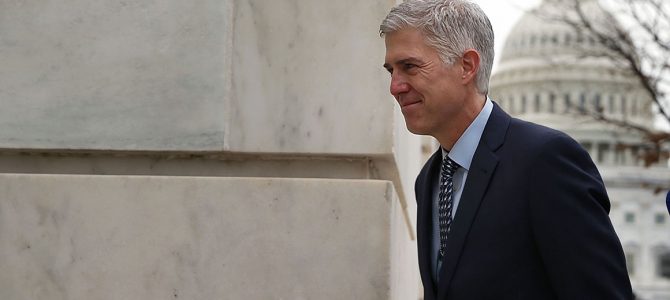
Things are looking good for Supreme Court nominee Neil Gorsuch as he prepares for his confirmation hearings, which begin March 20. Judge Gorsuch has continued to be his charming and disarming self, leaving Democrats with little to latch onto in opposition and only increasing his already-solid chances for securing a seat on the high court. Indeed, a recent survey showed that 91 percent of Democratic congressional staffers expect Gorsuch to be confirmed—and only 41 percent expect there to be an attempted filibuster.
Still, senators shouldn’t look past the upcoming hearings. After all, this is a unique opportunity to get to know the nominee’s mind and to educate the American people about constitutionalism and the legal process. It’s literally the only time that someone on the verge of ascending to the pinnacle of one of our three branches of government—for life!—goes toe-to-toe with politicians who are accountable to the people.
To be sure, such hearings have become kabuki theater. Senators from the president’s party toss softballs that let the nominee display his or her erudition, while opposing senators ask “gotcha” questions that anybody skilled enough to be nominated can evade with ease. Indeed, the nominee in the supposed hot seat has been trained for weeks to talk a lot while revealing very little, literally running out the clock allotted for each senator’s questions while executing what’s been called the (Ruth Bader) Ginsburg “pincer movement”: refusing to analyze hypothetical cases because those issues might come before the court and then declining to discuss broader doctrinal issues because judges should only deal in specifics.
As one observer put it: “When the Senate ceases to engage nominees in meaningful discussion of legal issues, the confirmation process takes on an air of vacuity and farce, and the Senate becomes incapable of either properly evaluating nominees or appropriately educating the public.” Untenured law professor Elena Kagan was not wrong in writing that back in 1995, even if the would-be justice recanted her emperor-has-no-clothes logic when she herself became a nominee.
But it doesn’t have to be that way. By focusing on constitutional clauses, not cases—recall Sen. Arlen Specter’s bizarre question to then-Judge John Roberts regarding whether Roe v. Wade was a “super-duper precedent”—and asking about reasoning rather than results, senators can restore the “teachable moment” that these hearings are supposed to be.
Here are some ideas of what that might look like as Neil Gorsuch takes center stage:
- You’ve stated in the past that you interpret the Constitution according to its original public meaning. What factors do you look to in ascertaining that? In situations where the original public meaning is unclear, what interpretive methods will you rely on? Relatedly, at what point should original meaning give way to stare decisis and the force of precedent?
- The first sections of Articles I, II, and III, respectively, are known as the “vesting” clauses, laying out the distinct roles of each branch of government. What do you think each clause means, and why is this important to protecting people’s individual rights?
- The administrative state often consists of agencies’ combining of legislative, executive, and judicial powers. To what extent is that unavoidable given the scope of modern government—and what about independent agencies that in theory aren’t part of any branch?—and how should judges check the bureaucracy?
- Do you think judges should more strictly review laws and regulations that bear criminal penalties? In what circumstances does the Constitution allow criminal punishments where there is no intention or knowledge of wrongdoing?
- Under Article I, Section 8, Congress has the power to “lay and collect Taxes, Duties, Imposts, and Excises, to pay the Debts and provide for the common defense and general Welfare of the United States.” Is this General Welfare Clause a grant of power or a limitation?
- Congress justifies much of the legislation it enacts today (if at all) by invoking the power to regulate interstate commerce. Some would say that the scope of this Commerce Clause has grown to the point where it constitutes a federal police power. What is the original meaning of this clause and what are some judicially enforceable limits on it?
- Does the Second Amendment protect an individual right to carry arms or just the right to keep them at home? How would you go about analyzing whether a particular restriction on this right is constitutional?
- The Ninth Amendment specifies that the Bill of Rights doesn’t provide an exhaustive list of rights that “We the People” have. What are some of these unenumerated rights and how are judges to determine whether a particular asserted right is constitutionally protected?
- How should judges enforce rights protected by the Fourteenth Amendment? Did this amendment truly “incorporate” the Bill of Rights or does it protect both more and less than the rights enumerated there? What rights does the Privileges or Immunities Clause protect and what role should it play in areas now dominated by the Due Process and Equal Protection Clauses?
- In light of your remarks that only a “bad judge” likes every result he reaches, please describe a case where you ruled against your policy preferences. Conversely, in cases where you rule in accord with your personal views, how do you know that your motivations are pure?
Imagine how fruitful an exercise this would be if only a few Judiciary Committee members go into such lines of questioning. And if Gorsuch, or any future judicial nominee, refuses to answer other than by offering platitudes or recitations of the relevant case law, senators should be free to make adverse inferences.
Only by holding nominees’ feet to the substantive constitutional fire can we make confirmation hearings great again.








